Unit 1 The secrets of happiness重点词汇学案(含答案解析)外研版七年级英语下
文档属性
| 名称 | Unit 1 The secrets of happiness重点词汇学案(含答案解析)外研版七年级英语下 | 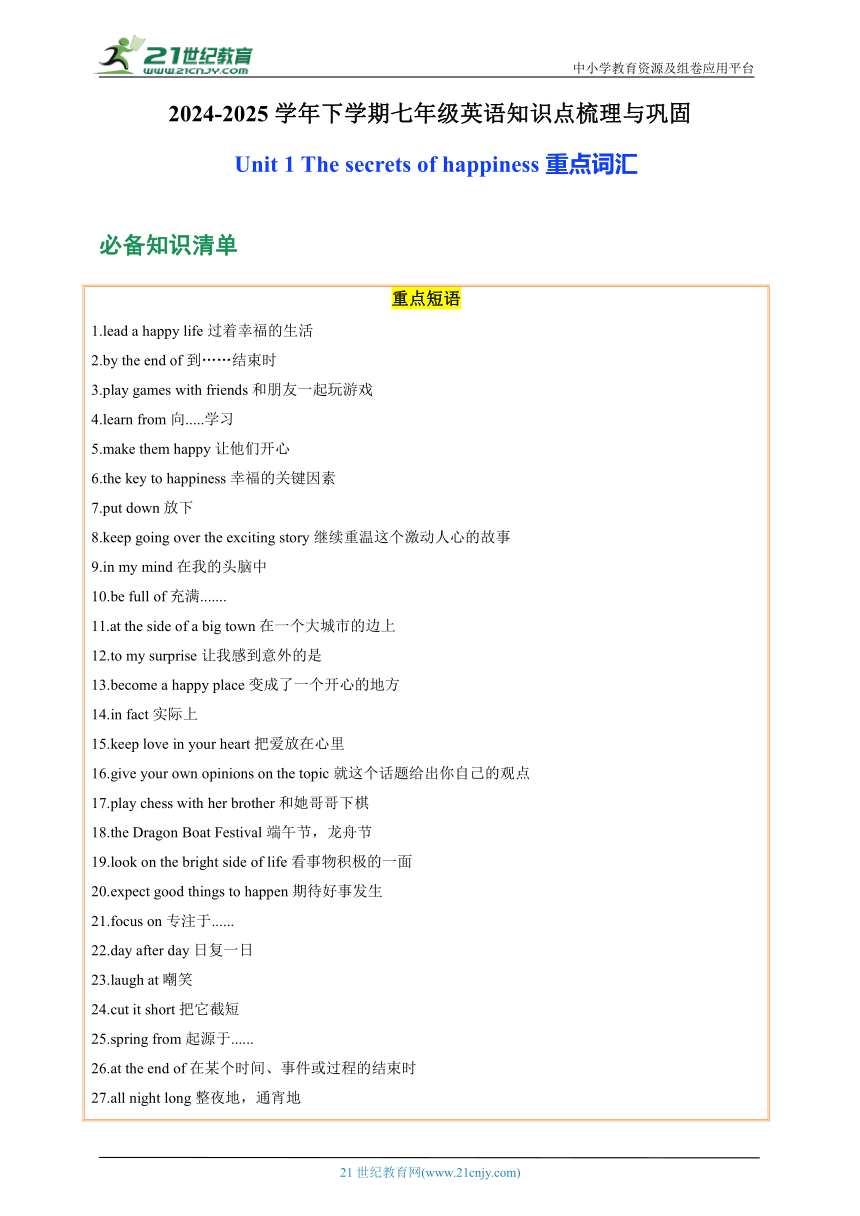 | |
| 格式 | docx | ||
| 文件大小 | 68.3KB | ||
| 资源类型 | 试卷 | ||
| 版本资源 | 外研版 | ||
| 科目 | 英语 | ||
| 更新时间 | 2025-06-28 20:58:37 | ||
图片预览

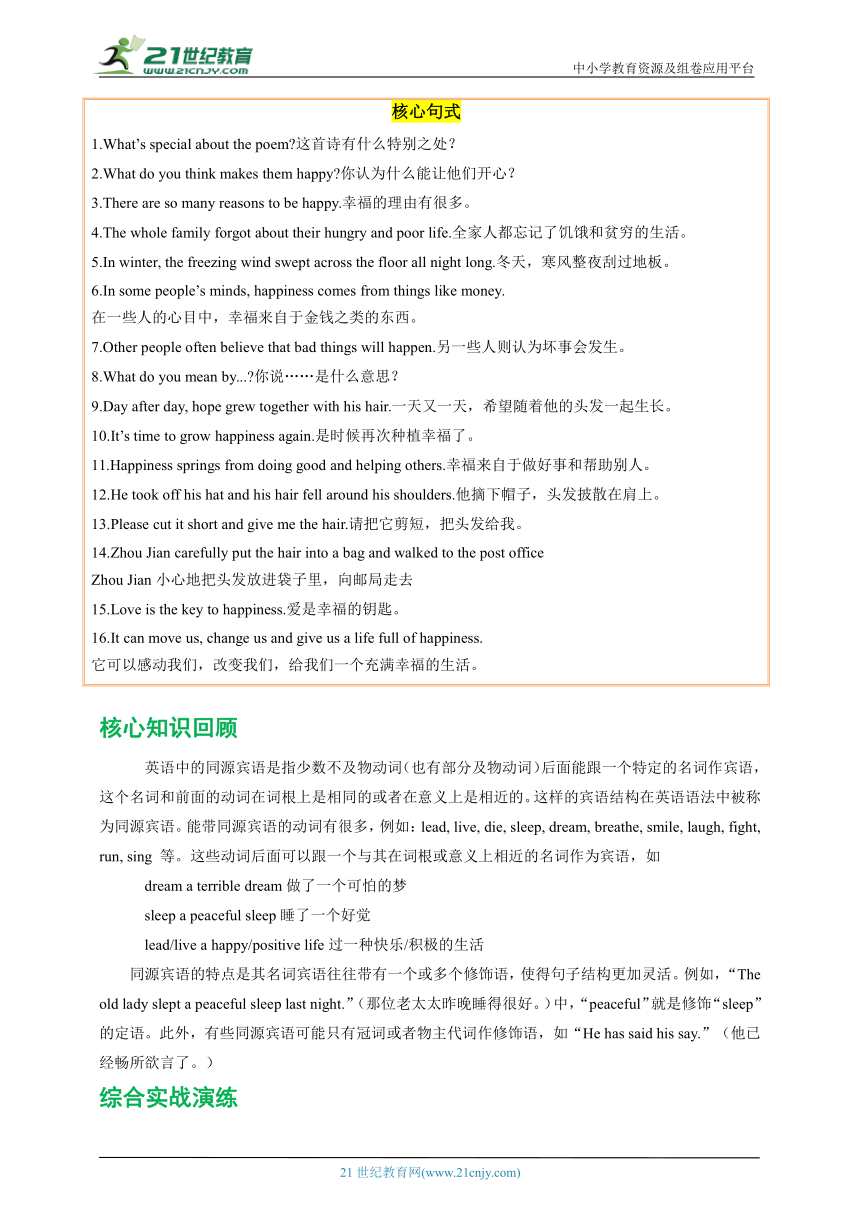
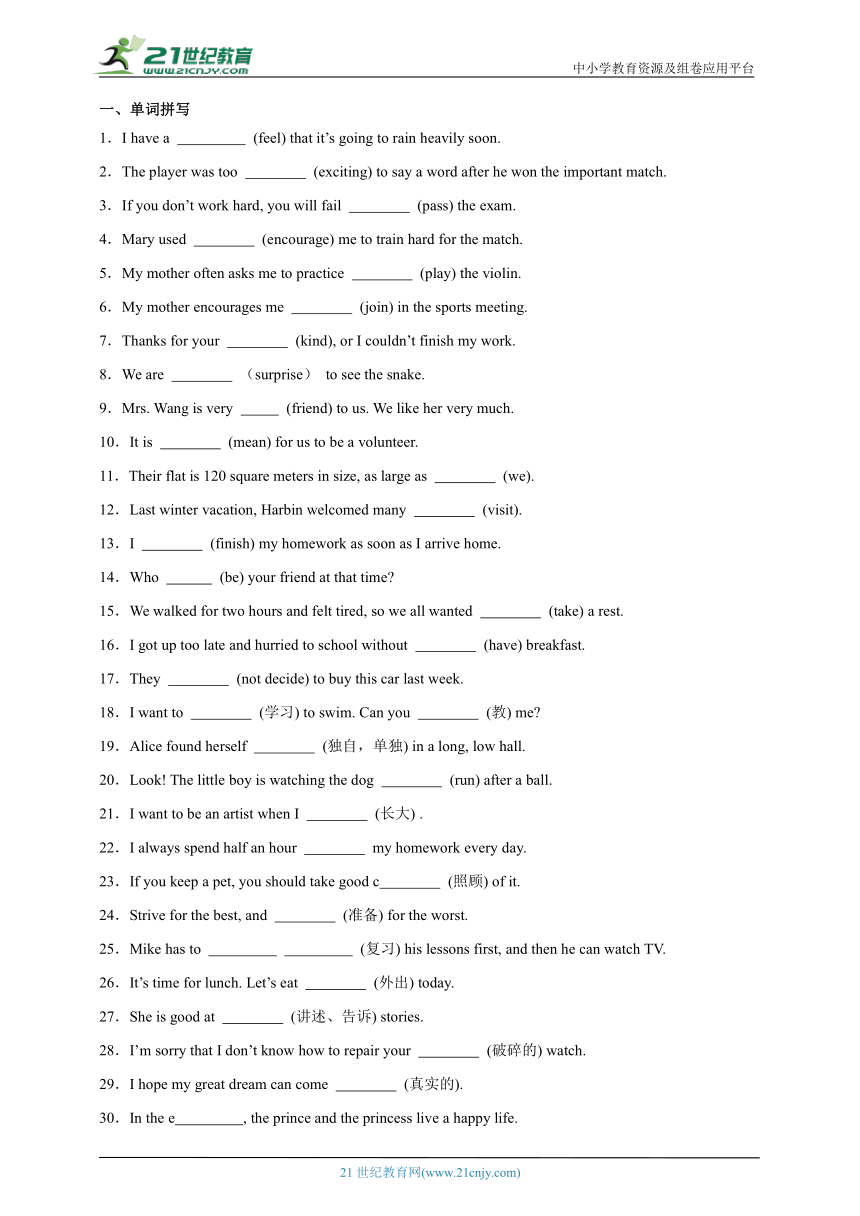
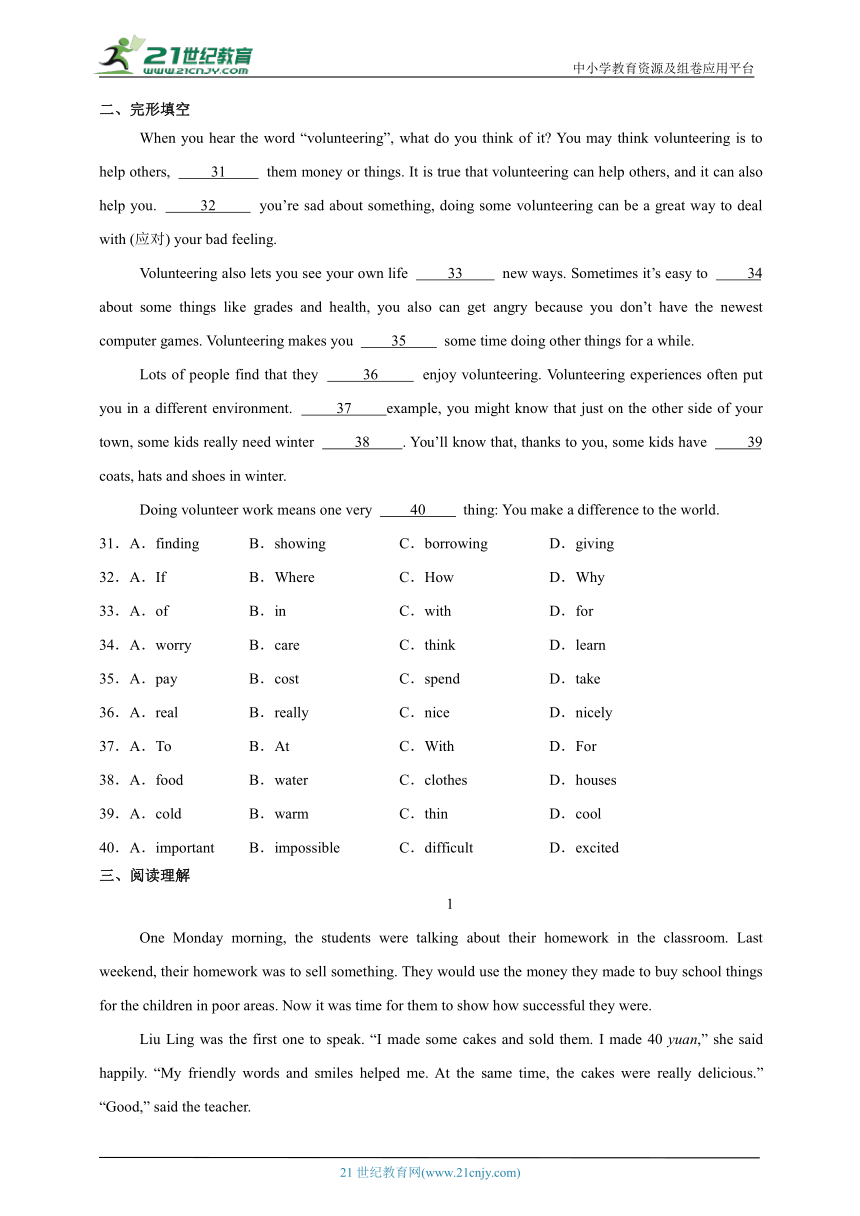
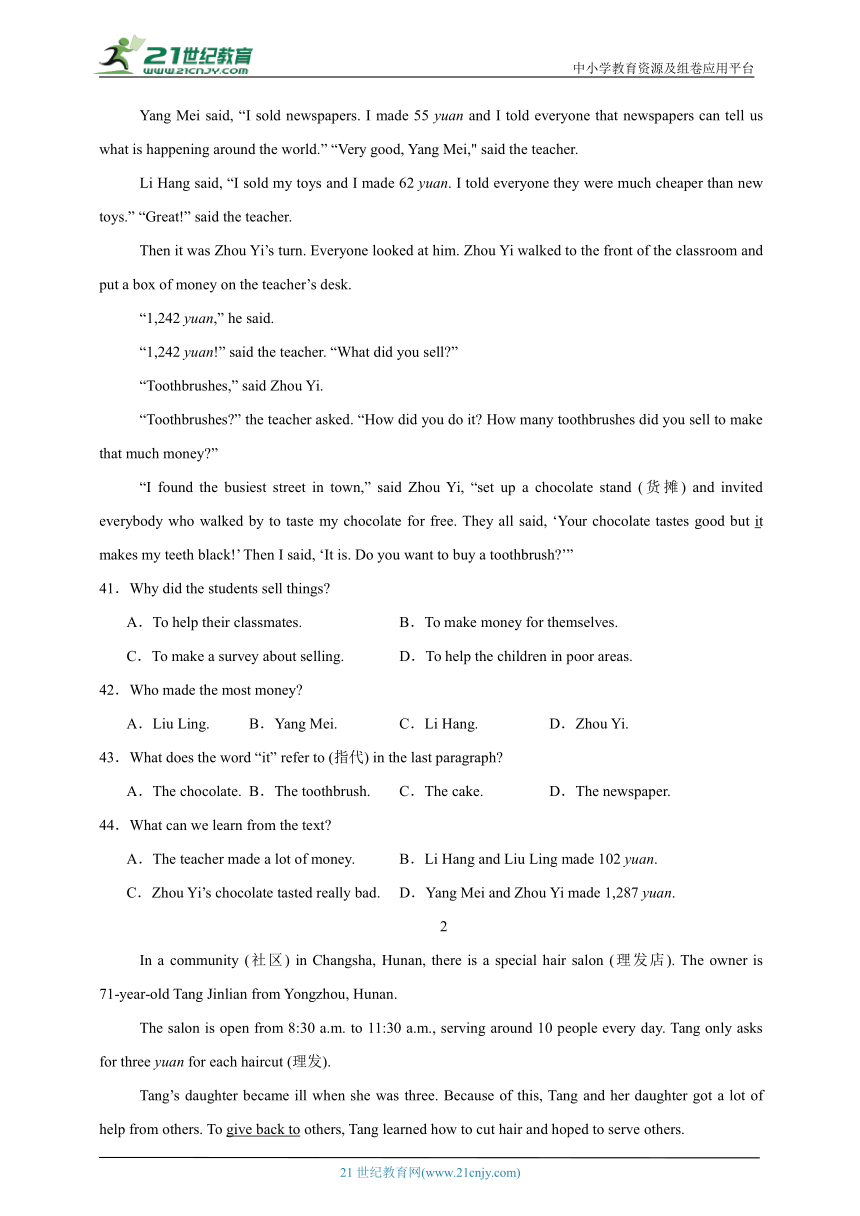
文档简介
中小学教育资源及组卷应用平台
2024-2025学年下学期七年级英语知识点梳理与巩固
Unit 1 The secrets of happiness重点词汇
必备知识清单
重点短语 1.lead a happy life过着幸福的生活 2.by the end of到……结束时 3.play games with friends和朋友一起玩游戏 4.learn from向.....学习 5.make them happy让他们开心 6.the key to happiness幸福的关键因素 7.put down放下 8.keep going over the exciting story继续重温这个激动人心的故事 9.in my mind在我的头脑中 10.be full of充满....... 11.at the side of a big town在一个大城市的边上 12.to my surprise让我感到意外的是 13.become a happy place变成了一个开心的地方 14.in fact实际上 15.keep love in your heart把爱放在心里 16.give your own opinions on the topic就这个话题给出你自己的观点 17.play chess with her brother和她哥哥下棋 18.the Dragon Boat Festival端午节,龙舟节 19.look on the bright side of life看事物积极的一面 20.expect good things to happen期待好事发生 21.focus on专注于...... 22.day after day日复一日 23.laugh at嘲笑 24.cut it short把它截短 25.spring from起源于...... 26.at the end of在某个时间、事件或过程的结束时 27.all night long整夜地,通宵地 核心句式 1.What’s special about the poem 这首诗有什么特别之处? 2.What do you think makes them happy 你认为什么能让他们开心? 3.There are so many reasons to be happy.幸福的理由有很多。 4.The whole family forgot about their hungry and poor life.全家人都忘记了饥饿和贫穷的生活。 5.In winter, the freezing wind swept across the floor all night long.冬天,寒风整夜刮过地板。 6.In some people’s minds, happiness comes from things like money. 在一些人的心目中,幸福来自于金钱之类的东西。 7.Other people often believe that bad things will happen.另一些人则认为坏事会发生。 8.What do you mean by... 你说……是什么意思? 9.Day after day, hope grew together with his hair.一天又一天,希望随着他的头发一起生长。 10.It’s time to grow happiness again.是时候再次种植幸福了。 11.Happiness springs from doing good and helping others.幸福来自于做好事和帮助别人。 12.He took off his hat and his hair fell around his shoulders.他摘下帽子,头发披散在肩上。 13.Please cut it short and give me the hair.请把它剪短,把头发给我。 14.Zhou Jian carefully put the hair into a bag and walked to the post office Zhou Jian小心地把头发放进袋子里,向邮局走去 15.Love is the key to happiness.爱是幸福的钥匙。 16.It can move us, change us and give us a life full of happiness. 它可以感动我们,改变我们,给我们一个充满幸福的生活。
核心知识回顾
英语中的同源宾语是指少数不及物动词(也有部分及物动词)后面能跟一个特定的名词作宾语,这个名词和前面的动词在词根上是相同的或者在意义上是相近的 。这样的宾语结构在英语语法中被称为同源宾语。能带同源宾语的动词有很多,例如:lead, live, die, sleep, dream, breathe, smile, laugh, fight, run, sing 等 。这些动词后面可以跟一个与其在词根或意义上相近的名词作为宾语,如
dream a terrible dream做了一个可怕的梦
sleep a peaceful sleep睡了一个好觉
lead/live a happy/positive life过一种快乐/积极的生活
同源宾语的特点是其名词宾语往往带有一个或多个修饰语,使得句子结构更加灵活。例如,“The old lady slept a peaceful sleep last night.”(那位老太太昨晚睡得很好。)中,“peaceful”就是修饰“sleep”的定语 。此外,有些同源宾语可能只有冠词或者物主代词作修饰语,如“He has said his say.”(他已经畅所欲言了。)
综合实战演练
一、单词拼写
1.I have a (feel) that it’s going to rain heavily soon.
2.The player was too (exciting) to say a word after he won the important match.
3.If you don’t work hard, you will fail (pass) the exam.
4.Mary used (encourage) me to train hard for the match.
5.My mother often asks me to practice (play) the violin.
6.My mother encourages me (join) in the sports meeting.
7.Thanks for your (kind), or I couldn’t finish my work.
8.We are (surprise) to see the snake.
9.Mrs. Wang is very (friend) to us. We like her very much.
10.It is (mean) for us to be a volunteer.
11.Their flat is 120 square meters in size, as large as (we).
12.Last winter vacation, Harbin welcomed many (visit).
13.I (finish) my homework as soon as I arrive home.
14.Who (be) your friend at that time
15.We walked for two hours and felt tired, so we all wanted (take) a rest.
16.I got up too late and hurried to school without (have) breakfast.
17.They (not decide) to buy this car last week.
18.I want to (学习) to swim. Can you (教) me
19.Alice found herself (独自,单独) in a long, low hall.
20.Look! The little boy is watching the dog (run) after a ball.
21.I want to be an artist when I (长大) .
22.I always spend half an hour my homework every day.
23.If you keep a pet, you should take good c (照顾) of it.
24.Strive for the best, and (准备) for the worst.
25.Mike has to (复习) his lessons first, and then he can watch TV.
26.It’s time for lunch. Let’s eat (外出) today.
27.She is good at (讲述、告诉) stories.
28.I’m sorry that I don’t know how to repair your (破碎的) watch.
29.I hope my great dream can come (真实的).
30.In the e , the prince and the princess live a happy life.
二、完形填空
When you hear the word “volunteering”, what do you think of it You may think volunteering is to help others, 31 them money or things. It is true that volunteering can help others, and it can also help you. 32 you’re sad about something, doing some volunteering can be a great way to deal with (应对) your bad feeling.
Volunteering also lets you see your own life 33 new ways. Sometimes it’s easy to 34 about some things like grades and health, you also can get angry because you don’t have the newest computer games. Volunteering makes you 35 some time doing other things for a while.
Lots of people find that they 36 enjoy volunteering. Volunteering experiences often put you in a different environment. 37 example, you might know that just on the other side of your town, some kids really need winter 38 . You’ll know that, thanks to you, some kids have 39 coats, hats and shoes in winter.
Doing volunteer work means one very 40 thing: You make a difference to the world.
31.A.finding B.showing C.borrowing D.giving
32.A.If B.Where C.How D.Why
33.A.of B.in C.with D.for
34.A.worry B.care C.think D.learn
35.A.pay B.cost C.spend D.take
36.A.real B.really C.nice D.nicely
37.A.To B.At C.With D.For
38.A.food B.water C.clothes D.houses
39.A.cold B.warm C.thin D.cool
40.A.important B.impossible C.difficult D.excited
三、阅读理解
1
One Monday morning, the students were talking about their homework in the classroom. Last weekend, their homework was to sell something. They would use the money they made to buy school things for the children in poor areas. Now it was time for them to show how successful they were.
Liu Ling was the first one to speak. “I made some cakes and sold them. I made 40 yuan,” she said happily. “My friendly words and smiles helped me. At the same time, the cakes were really delicious.” “Good,” said the teacher.
Yang Mei said, “I sold newspapers. I made 55 yuan and I told everyone that newspapers can tell us what is happening around the world.” “Very good, Yang Mei," said the teacher.
Li Hang said, “I sold my toys and I made 62 yuan. I told everyone they were much cheaper than new toys.” “Great!” said the teacher.
Then it was Zhou Yi’s turn. Everyone looked at him. Zhou Yi walked to the front of the classroom and put a box of money on the teacher’s desk.
“1,242 yuan,” he said.
“1,242 yuan!” said the teacher. “What did you sell ”
“Toothbrushes,” said Zhou Yi.
“Toothbrushes ” the teacher asked. “How did you do it How many toothbrushes did you sell to make that much money ”
“I found the busiest street in town,” said Zhou Yi, “set up a chocolate stand (货摊) and invited everybody who walked by to taste my chocolate for free. They all said, ‘Your chocolate tastes good but it makes my teeth black!’ Then I said, ‘It is. Do you want to buy a toothbrush ’”
41.Why did the students sell things
A.To help their classmates. B.To make money for themselves.
C.To make a survey about selling. D.To help the children in poor areas.
42.Who made the most money
A.Liu Ling. B.Yang Mei. C.Li Hang. D.Zhou Yi.
43.What does the word “it” refer to (指代) in the last paragraph
A.The chocolate. B.The toothbrush. C.The cake. D.The newspaper.
44.What can we learn from the text
A.The teacher made a lot of money. B.Li Hang and Liu Ling made 102 yuan.
C.Zhou Yi’s chocolate tasted really bad. D.Yang Mei and Zhou Yi made 1,287 yuan.
2
In a community (社区) in Changsha, Hunan, there is a special hair salon (理发店). The owner is 71-year-old Tang Jinlian from Yongzhou, Hunan.
The salon is open from 8:30 a.m. to 11:30 a.m., serving around 10 people every day. Tang only asks for three yuan for each haircut (理发).
Tang’s daughter became ill when she was three. Because of this, Tang and her daughter got a lot of help from others. To give back to others, Tang learned how to cut hair and hoped to serve others.
In 2004, Tang’s son came to work in Changsha. Tang and her daughter followed. At first, Tang set up a hairdressing stall (理发摊) at a vegetable market. Later she moved the stall to Lufeng Community, Changsha. But it was too small and few people wanted to come. Finally, the community workers helped her. In 2015, they turned a garage (车库) into a hair salon for Tang to use.
Tang said, “In the past, many people helped me. Now I want to help more people.”
45.When is the salon open
A.In the morning. B.In the afternoon.
C.On workdays. D.On weekends.
46.What can we get from Paragraph 3
A.Tang’s son was unhealthy. B.Tang’s son came to work in Changsha.
C.Tang lived in Changsha with his family. D.Tang’s daughter got much help from others.
47.The underlined words “give back to” mean ______ in Chinese.
A.分发 B.回报 C.给予 D.赠送
48.Which is the following is the best title (标题) for the passage
A.Tang and her daughter B.Tang’s life in Changsha
C.A special hair salon D.A famous community
四、短文填空
Daniel is a doctor from America. To make full use of (充分利用) his free time, he often does volunteer work in his community. Daniel feels happy when 49 (help) others in need.
Every Saturday, Daniel goes to help Mr Smith. Mr Smith is 80 and he lives alone. His house is not far 50 Daniel’s, so Daniel usually rides 10 minutes 51 (get) there. In the morning, Daniel reads newspapers to Mr Smith, 52 (fix) broken things, cleans the room and does some shopping for him. In the afternoon, Daniel takes 53 walk with Mr Smith to help him keep fit. After a full day, Daniel is tired but happy.
“Everyone 54 (need) help more or less. It’s not difficult 55 (help) others, and everyone can give a hand. And we can just start with 56 (cut) grass, watering flowers or removing (清除) snow,” Daniel always says.
Daniel thinks it is important to do community volunteer work. First, it can bring neighbours together. 57 (two), it can make the neighbourhood a better place to live. Third, 58 young people, they can learn life skills and get knowledge (知识) from the volunteer work.
五、完成句子
59.I bought a jacket for my father’s birthday. (改为否定句)
I a jacket for my father’s birthday.
60.Lily不在这儿,你能捎个口信给她吗?
Lily isn’t here. Can you for her
61.我很享受周末和家人相处的时光。
I enjoy my family on weekends.
62.Steve 和他的朋友们正在家里听音乐。
Steve and his friends are music at home.
63.你回去的时候,能不能给我捎个口信?
When you go back, would you for me
64.John was nice at school. (对划线部分提问)
John at school
65.I’m going to learn a dragon dance this evening. (就划线部分提问)
you learn a dragon dance
66.It’s one kilo a bag.(对划线部分提问)
is it
67.That is Lucy’s bike.(对画线部分提问)
is that
68. She knocked on the door. (就划线部分提问)
on the door
参考答案
一、
1.feeling
【解析】句意:我有一种感觉,很快就会下大雨了。a修饰可数名词单数feeling“感觉”,故填feeling。
2.excited
【解析】句意:这名球员在赢得这场重要的比赛后激动得说不出一句话来。根据“The player was too…to say a word after he won the important match.”可知作be动词的表语用形容词,形容人用excited表示“激动的”。故填excited。
3.to pass
【解析】句意:如果你不努力,你将无法通过考试。fail后用动词不定式,fail to do sth.未能做某事。故填to pass。
4.to encourage
【解析】句意:玛丽过去常鼓励我为比赛刻苦训练。used to do sth“过去常常做某事”, 是固定搭配。故填to encourage。
5.playing
【解析】句意:我的妈妈经常要求我去练习拉小提琴。根据“practice”可知,此处用doing形式。故填playing。
6.to join
【解析】句意:我妈妈鼓励我参加运动会。根据“encourages me”可知此处应用动词短语encourage sb to do sth表示“鼓励某人做某事”,动词join的不定式为to join。故填to join。
7.kindness
【解析】句意:谢谢你的好意,否则我无法完成学业。根据空前的形容词性物主代词“your”可知,空处填名词,结合提示词可知填kindness“好意、善行”,故填kindness。
8.surprised
【解析】句意:我们看到蛇很吃惊。be surprised to do sth“吃惊地做某事”,空格处修饰人,用形容词ed形式。故填surprised。
9.friendly
【解析】句意:王太太对我们很友好。我们非常喜欢她。根据“Mrs. Wang is very…to us. We like her very much.”可知,此处指王太太对“我们”很友好,空前有is,空处应用形容词作表语;friend“朋友”,名词,其形容词为friendly,be friendly to sb.“对某人友好”,固定短语。故填friendly。
10.meaningful
【解析】句意:对我们来说,成为一名志愿者是有意义的。分析句子可知,此处应用形容词作表语,meaningful是其形容词形式。故填meaningful。
11.ours
【解析】句意:他们的公寓有120平方米,和我们的一样大。此处是将他们和我们的公寓进行比较,且空格后无名词,所以用名词性物主代词ours“我们的”。故填ours。
12.visitors
【解析】句意:去年寒假,哈尔滨迎来了许多游客。根据“Harbin welcomed many”可知,来哈尔滨的是游客,应用名词visitor,many修饰可数复数名词。故填visitors。
13.will finish
【解析】句意:我一到家就把作业做完。finish“完成”,动词。根据“as soon as”可知,as soon as引导的时间状语从句,主句用一般将来时,从句用一般现在时。故填will finish。
14.was
【解析】句意:当时你的朋友是谁?根据“Who…your friend at that time ”可知,此处指“你的朋友是谁”,句子时态为一般过去时,应填be动词的过去式。故填was。
15.to take
【解析】句意:我们走了两个小时,感觉很累,所以我们都想休息一下。want to do sth“想要做某事”,结合所给单词提示,故填to take。
16.having
【解析】句意:我起晚了,没吃早饭就匆忙地冲向学校。without介词,意为“没有”,后接动名词形式 having。故填having。
17.didn't decide
【解析】句意:他们上周没有决定要买这辆车。根据“last week”可知要用一般过去时,谓语是实义动词decide,not前借助did构成否定句,did not缩写为didn't,其后decide用原形。故填didn't decide。
18. learn teach
【解析】句意:我想学游泳。你能教我吗?learn“学习”,want to do sth“想做某事”;teach“教”,情态动词can后接动词原形。故填learn;teach。
19.alone
【解析】句意:Alice发现自己一个人在一个长而低的大厅里。“独自,单独”alone,形容词作宾语补足语,故填alone。
20.running
【解析】句意:看!小男孩正看着那只正在追球的狗。run“跑”,动词,又结合“Look…watching the dog…”可知,该句描述此刻正在发生的动作,动词短语watch sb. doing“看某人正在做某事”符合题意,应用现在分词形式作宾语补足语。故填running。
21.grow up
【解析】句意:我长大后想成为一名艺术家。根据中文提示,grow up“长大”符合语境,此句是一般现在时,主语是“I”,动词填原形。故填grow up。
22.on/doing
【解析】句意:我每天总是花半小时做作业。根据“spend half an hour”可知,考查spend some time on/doing sth“花时间做某事”,do one’s homework“做作业”。故填on/doing。
23.(c)are
【解析】句意:如果你养宠物,你应该好好照顾它。根据题干可知设空处应填care“照顾”;take good care of“好好照顾”,固定短语。故填(c)are。
24.prepare
【解析】句意:争取最好的结果,做最坏的打算。根据前文“Strive for the best, and”可知,此句是由动词原形开头的祈使句,结合横线后“for the worst”和中文提示可知,此处考查动词短语:prepare for“为……而做准备”。故填prepare。
25. go over
【解析】句意:迈克必须先复习功课,然后才能看电视。复习:go over,have to do sth.“不得不做某事”。故填go;over。
26.out
【解析】句意:该吃午饭了。今天我们出去吃吧。eat out“出去吃饭”。故填out。
27.telling
【解析】句意:她擅长讲故事。tell“讲述,告诉”,tell stories“讲故事”,be good at doing sth“擅长做某事”,动名词作宾语,故填telling。
28.broken
【解析】句意:非常抱歉,我不知道怎么修理你的坏手表。。“破碎的”broken,形容词,作定语。故填broken。
29.true
【解析】句意:我希望我的伟大梦想能够实现。根据汉语提示可知,此处应用形容词true表示“真实的”,come true“实现”是动词短语。故填true。
30.(e)nd
【解析】句意:最后,王子和公主过着幸福的生活。根据“In the…the prince and the princess live a happy life.”及首字母可知,此处指的是最后,王子和公主过着幸福的生活。in the end“最后”,固定短语,符合语境。故填(e)nd。
二、
31.D 32.A 33.B 34.A 35.C 36.B 37.D 38.C 39.B 40.A
【解析】志愿活动帮助别人也帮助自己,可以让自己处理不良情绪、以新的方式看待自己的生活,并且对自己能帮助别人感到高兴。志愿活动很重要,它可以改变世界。
31.句意:你可能认为志愿服务就是帮助别人,给他们钱或东西。
finding找到;showing展示;borrowing借;giving给。根据“You may think volunteering is to help others”及语境可知,此处指“给某人钱或东西”,give sb. sth.“给某人某物”符合语境。故选D。
32.句意:如果你对某件事感到难过,做一些志愿活动是处理这种糟糕情绪的好方法。
If如果;Where哪里;How如何;Why为什么。根据“you’re sad about something”及“doing some volunteering can be a great way to deal with your bad feeling”可知,此处表示某种条件或情况下的建议,应用if引导条件状语从句,意为“如果”。故选A。
33.句意:志愿活动还能让你以新的方式看待自己的生活。
of……的;in在……里面,以……方式;with和;for为了。根据语境可知,此处表示“以新的方式”,应用介词in与之搭配,in…ways“以……方式”符合语境。故选B。
34.句意:有时候很容易担心一些事情,比如成绩和健康,你也会因为没有最新的电脑游戏而生气。
worry担心;care关心;think认为;learn学习。根据“Sometimes it’s easy to…about some things like grades and health, you also can get angry because you don’t have the newest computer games.”可知,此处指“担心一些事情”,worry about sth.“担心某事”符合语境。故选A。
35.句意:志愿活动让你花一些时间做其他事情。
pay支付(金钱),主语通常为人;cost花费(费用),主语通常为物;spend花费(时间,金钱或精力),主语通常为人;take花费,主语通常为it作形式主语。根据“Volunteering makes you…some time doing other things for a while.”可知,此处指花费时间做一些其他的事情,应用spend与之搭配,spend+时间+doing sth“花费时间做某事”符合语境。故选C。
36.句意:很多人发现他们真的很喜欢做志愿者。
real真的;really真正地;nice美好的;nicely漂亮地,恰好地。根据“Volunteering experiences often put you in a different environment志愿服务的经历通常会让你置身于一个不同的环境中”及全文对志愿者工作好处的介绍可知,此处指“真正地”喜欢志愿者工作,应用副词really修饰动词enjoy,起强调作用。故选B。
37.句意:例如,你可能知道,就在你的城镇的另一边,一些孩子真的需要冬天的衣服。
To到;At在;With和;For因为,为了。结合语境和“…example”可知,此处应用介词for与之搭配,for example“例如”符合语境。故选D。
38.例如,你可能知道,就在你的城镇的另一边,一些孩子真的需要冬天的衣服。
food食物;water水;clothes衣服;houses房子。根据后文“thanks to you, some kids have…coats, hats and shoes in winter.”及尝试可知,“coats, hats and shoes”属于衣服类。故选C。
39.句意:你会知道,多亏了你,一些孩子在冬天有了保暖的外套、帽子和鞋子。
cold冷的;warm温暖的;thin瘦的;cool酷的。根据前文“some kids really need winter…”及语境可知,孩子们需要冬装保持温暖。故选B。
40.句意:做志愿者工作意味着一件非常重要的事情:你在改变世界。
important重要的;impossible不可能的;difficult困难的;excited激动的。根据“You make a difference to the world.做志愿者工作意味着改变世界”及全文对志愿者工作好处的介绍可推测,志愿活动是重要的。故选A。
三
1
41.D 42.D 43.A 44.B
【解析】本文主要讲述了学生们在向老师展示上周末义卖活动取得的成果,每个学生讲述了获得的金额以及义卖的方式,最后金额最高的周易讲述了自己如何用免费品尝巧克力的方式卖出更多的牙刷。
41.细节理解题。根据“They would use the money they made to buy school things for the children in poor areas”可知,他们会用赚来的钱给贫困地区的孩子买学习用品。故选D。
42.细节理解题。根据“Then it was Zhou Yi’s turn. Everyone looked at him. Zhou Yi walked to the front of the classroom and put a box of money on the teacher’s desk. ‘1,242 yuan,’ he said.”可知,周易赚得钱最多。故选D。
43.词义猜测题。根据“Your chocolate tastes good but it makes my teeth black!”可知,此处指的是“你的巧克力味道很好,但是它让我的牙齿变黑了!”,因此it代指的是“巧克力”。故选A。
44.推理判断题。根据“Liu Ling was the first one to speak. ‘I made some cakes and sold them. I made 40 yuan,’ ”及“Li Hang said, ‘I sold my toys and I made 62 yuan. I told everyone they were much cheaper than new toys.’ ”可知,刘玲和李航一共赚了102元。故选B。
2
45.A 46.D 47.B 48.C
【解析】本文主要介绍一位71岁的老人在社区开了一家特殊的理发店,她是为了回报社会。
45.细节理解题。根据“The salon is open from 8:30 a.m. to 11:30 a.m.”可知,理发店只开一上午,故选A。
46.细节理解题。根据“Tang’s daughter became ill when she was three. Because of this, Tang and her daughter got a lot of help from others.”可知,唐的女儿得到了很多人的帮助,故选D。
47.词义猜测题。根据“To give back to others, Tang learned how to cut hair and hoped to serve others.”可知,唐学习理发,希望能够服务别人,回报别人的帮助,所以give back to意为“回报”,故选B。
48.最佳标题题。根据“In a community (社区) in Changsha, Hunan, there is a special hair salon (理发店).”和“In the past, many people helped me. Now I want to help more people.”及全文内容可知,本文主要介绍一位71岁的老人在社区开了一家特殊的理发店,她是为了回报社会。故选C。
四、
49.helping 50.from 51.to get 52.fixes 53.a 54.needs 55.to help 56.cutting 57.Second 58.for
【解析】本文主要讲来自美国的医生丹尼尔在社区做志愿者活动帮助史密斯老人的事情。
49.句意:当帮助有需要的人时丹尼尔感觉很高兴。when doing sth“当做某事时”,是一种省略结构,“help”和主语Daniel是主谓关系,故填helping。
50.句意:他的房子离丹尼尔的不远,所以丹尼尔经常骑车十分钟到那里。far from“远离”。故填from。
51.句意:他的房子离丹尼尔的不远,所以丹尼尔经常骑车十分钟到那里。空处用不定式表示目的,故填to get。
52.句意:上午丹尼尔给Smith先生读报纸,修理破旧的东西,打扫房间,并为他做一些购物。空处与“reads”并列,表示做的一些事情,动词用三单形式。故填fixes。
53.句意:下午丹尼尔和Smith先生一起散步来帮助他保持健康。take a walk“散步”,故填a。
54.句意:每个人都需要或多或少的帮助。主语“everyone”是单数,动词用三单形式。故填needs。
55.句意:帮助别人并不困难,并且每个人都可以伸出援助之手。It is +adj. +for sb. to do sth.“对于某人来说做某事是……”。此句型中it作形式主语,真正的主语是后面的不定式。故填to help。
56.句意:我们可以从剪草,浇花或者铲雪开始。空处与“watering flowers or removing (清除) snow”并列,用动名词形式。故填cutting。
57.句意:第二,他可以使社区成为一个更好的地方来居住。此处和“First”呼应,用序数词表示第二点。故填Second。
58.句意:第三,对于年轻人来说,他们可以学到生活技能,并从志愿工作中获得知识。根据“...young people”可知for“对于”符合题意。故填for。
五、
59.didn’t buy
【解析】句意:我为我父亲的生日买了一件夹克。原句为一般过去时态的陈述句,改为否定句时,用助动词didn’t构成;动词bought恢复原形buy,买。故填didn’t buy。
60.take a message
【解析】take a message for sb.表示“给某人捎口信”。故填take a message。
61.spending time with
【解析】根据中英文对照,可知缺少“和……相处的时光”的表达,spend time with sb.意为“与某人共度时光”, enjoy doing sth.意为“享受做某事”,动词spend应使用动名词形式。故填spending time with。
62. listening to
【解析】根据所给句意可知,空白处表示“正在听”,listen to“听……”,应用现在进行时,其构成为“am/is/are doing”,故填listening;to。
63. take a message
【解析】分析句子可知,空处需要翻译的是“捎个口信”,take a message意为“捎个口信”,固定词组,would是情态动词,其后跟动词原形。故填take;a;message。
64. What was like
【解析】j句意:约翰在学校很好。划线部分表示在学校的表现,对此提问用句型“What be sb like...”,故填What;was;like。
65. When are going to
【解析】句意:今晚我要去学舞龙。划线部分表示时间,用疑问词when提问,将第一人称I改为第二人称you,be动词改为are提到主语前。故填When;are;going;to。
66. How heavy
【解析】句意:它是一袋一公斤。划线部分是重量,疑问词用how heavy“多重”。故填How;heavy。
67. Whose bike
【解析】句意:那是Lucy的自行车。对Lucy’s划线,应问“这是谁的自行车?”应用whose“谁的”提问,后接名词,故填Whose bike。
68. Who knocked
【解析】句意:她敲了一下门。划线部分表示人,对此提问用疑问词who,故填Who;knocked。
21世纪教育网 www.21cnjy.com 精品试卷·第 2 页 (共 2 页)
21世纪教育网(www.21cnjy.com)
2024-2025学年下学期七年级英语知识点梳理与巩固
Unit 1 The secrets of happiness重点词汇
必备知识清单
重点短语 1.lead a happy life过着幸福的生活 2.by the end of到……结束时 3.play games with friends和朋友一起玩游戏 4.learn from向.....学习 5.make them happy让他们开心 6.the key to happiness幸福的关键因素 7.put down放下 8.keep going over the exciting story继续重温这个激动人心的故事 9.in my mind在我的头脑中 10.be full of充满....... 11.at the side of a big town在一个大城市的边上 12.to my surprise让我感到意外的是 13.become a happy place变成了一个开心的地方 14.in fact实际上 15.keep love in your heart把爱放在心里 16.give your own opinions on the topic就这个话题给出你自己的观点 17.play chess with her brother和她哥哥下棋 18.the Dragon Boat Festival端午节,龙舟节 19.look on the bright side of life看事物积极的一面 20.expect good things to happen期待好事发生 21.focus on专注于...... 22.day after day日复一日 23.laugh at嘲笑 24.cut it short把它截短 25.spring from起源于...... 26.at the end of在某个时间、事件或过程的结束时 27.all night long整夜地,通宵地 核心句式 1.What’s special about the poem 这首诗有什么特别之处? 2.What do you think makes them happy 你认为什么能让他们开心? 3.There are so many reasons to be happy.幸福的理由有很多。 4.The whole family forgot about their hungry and poor life.全家人都忘记了饥饿和贫穷的生活。 5.In winter, the freezing wind swept across the floor all night long.冬天,寒风整夜刮过地板。 6.In some people’s minds, happiness comes from things like money. 在一些人的心目中,幸福来自于金钱之类的东西。 7.Other people often believe that bad things will happen.另一些人则认为坏事会发生。 8.What do you mean by... 你说……是什么意思? 9.Day after day, hope grew together with his hair.一天又一天,希望随着他的头发一起生长。 10.It’s time to grow happiness again.是时候再次种植幸福了。 11.Happiness springs from doing good and helping others.幸福来自于做好事和帮助别人。 12.He took off his hat and his hair fell around his shoulders.他摘下帽子,头发披散在肩上。 13.Please cut it short and give me the hair.请把它剪短,把头发给我。 14.Zhou Jian carefully put the hair into a bag and walked to the post office Zhou Jian小心地把头发放进袋子里,向邮局走去 15.Love is the key to happiness.爱是幸福的钥匙。 16.It can move us, change us and give us a life full of happiness. 它可以感动我们,改变我们,给我们一个充满幸福的生活。
核心知识回顾
英语中的同源宾语是指少数不及物动词(也有部分及物动词)后面能跟一个特定的名词作宾语,这个名词和前面的动词在词根上是相同的或者在意义上是相近的 。这样的宾语结构在英语语法中被称为同源宾语。能带同源宾语的动词有很多,例如:lead, live, die, sleep, dream, breathe, smile, laugh, fight, run, sing 等 。这些动词后面可以跟一个与其在词根或意义上相近的名词作为宾语,如
dream a terrible dream做了一个可怕的梦
sleep a peaceful sleep睡了一个好觉
lead/live a happy/positive life过一种快乐/积极的生活
同源宾语的特点是其名词宾语往往带有一个或多个修饰语,使得句子结构更加灵活。例如,“The old lady slept a peaceful sleep last night.”(那位老太太昨晚睡得很好。)中,“peaceful”就是修饰“sleep”的定语 。此外,有些同源宾语可能只有冠词或者物主代词作修饰语,如“He has said his say.”(他已经畅所欲言了。)
综合实战演练
一、单词拼写
1.I have a (feel) that it’s going to rain heavily soon.
2.The player was too (exciting) to say a word after he won the important match.
3.If you don’t work hard, you will fail (pass) the exam.
4.Mary used (encourage) me to train hard for the match.
5.My mother often asks me to practice (play) the violin.
6.My mother encourages me (join) in the sports meeting.
7.Thanks for your (kind), or I couldn’t finish my work.
8.We are (surprise) to see the snake.
9.Mrs. Wang is very (friend) to us. We like her very much.
10.It is (mean) for us to be a volunteer.
11.Their flat is 120 square meters in size, as large as (we).
12.Last winter vacation, Harbin welcomed many (visit).
13.I (finish) my homework as soon as I arrive home.
14.Who (be) your friend at that time
15.We walked for two hours and felt tired, so we all wanted (take) a rest.
16.I got up too late and hurried to school without (have) breakfast.
17.They (not decide) to buy this car last week.
18.I want to (学习) to swim. Can you (教) me
19.Alice found herself (独自,单独) in a long, low hall.
20.Look! The little boy is watching the dog (run) after a ball.
21.I want to be an artist when I (长大) .
22.I always spend half an hour my homework every day.
23.If you keep a pet, you should take good c (照顾) of it.
24.Strive for the best, and (准备) for the worst.
25.Mike has to (复习) his lessons first, and then he can watch TV.
26.It’s time for lunch. Let’s eat (外出) today.
27.She is good at (讲述、告诉) stories.
28.I’m sorry that I don’t know how to repair your (破碎的) watch.
29.I hope my great dream can come (真实的).
30.In the e , the prince and the princess live a happy life.
二、完形填空
When you hear the word “volunteering”, what do you think of it You may think volunteering is to help others, 31 them money or things. It is true that volunteering can help others, and it can also help you. 32 you’re sad about something, doing some volunteering can be a great way to deal with (应对) your bad feeling.
Volunteering also lets you see your own life 33 new ways. Sometimes it’s easy to 34 about some things like grades and health, you also can get angry because you don’t have the newest computer games. Volunteering makes you 35 some time doing other things for a while.
Lots of people find that they 36 enjoy volunteering. Volunteering experiences often put you in a different environment. 37 example, you might know that just on the other side of your town, some kids really need winter 38 . You’ll know that, thanks to you, some kids have 39 coats, hats and shoes in winter.
Doing volunteer work means one very 40 thing: You make a difference to the world.
31.A.finding B.showing C.borrowing D.giving
32.A.If B.Where C.How D.Why
33.A.of B.in C.with D.for
34.A.worry B.care C.think D.learn
35.A.pay B.cost C.spend D.take
36.A.real B.really C.nice D.nicely
37.A.To B.At C.With D.For
38.A.food B.water C.clothes D.houses
39.A.cold B.warm C.thin D.cool
40.A.important B.impossible C.difficult D.excited
三、阅读理解
1
One Monday morning, the students were talking about their homework in the classroom. Last weekend, their homework was to sell something. They would use the money they made to buy school things for the children in poor areas. Now it was time for them to show how successful they were.
Liu Ling was the first one to speak. “I made some cakes and sold them. I made 40 yuan,” she said happily. “My friendly words and smiles helped me. At the same time, the cakes were really delicious.” “Good,” said the teacher.
Yang Mei said, “I sold newspapers. I made 55 yuan and I told everyone that newspapers can tell us what is happening around the world.” “Very good, Yang Mei," said the teacher.
Li Hang said, “I sold my toys and I made 62 yuan. I told everyone they were much cheaper than new toys.” “Great!” said the teacher.
Then it was Zhou Yi’s turn. Everyone looked at him. Zhou Yi walked to the front of the classroom and put a box of money on the teacher’s desk.
“1,242 yuan,” he said.
“1,242 yuan!” said the teacher. “What did you sell ”
“Toothbrushes,” said Zhou Yi.
“Toothbrushes ” the teacher asked. “How did you do it How many toothbrushes did you sell to make that much money ”
“I found the busiest street in town,” said Zhou Yi, “set up a chocolate stand (货摊) and invited everybody who walked by to taste my chocolate for free. They all said, ‘Your chocolate tastes good but it makes my teeth black!’ Then I said, ‘It is. Do you want to buy a toothbrush ’”
41.Why did the students sell things
A.To help their classmates. B.To make money for themselves.
C.To make a survey about selling. D.To help the children in poor areas.
42.Who made the most money
A.Liu Ling. B.Yang Mei. C.Li Hang. D.Zhou Yi.
43.What does the word “it” refer to (指代) in the last paragraph
A.The chocolate. B.The toothbrush. C.The cake. D.The newspaper.
44.What can we learn from the text
A.The teacher made a lot of money. B.Li Hang and Liu Ling made 102 yuan.
C.Zhou Yi’s chocolate tasted really bad. D.Yang Mei and Zhou Yi made 1,287 yuan.
2
In a community (社区) in Changsha, Hunan, there is a special hair salon (理发店). The owner is 71-year-old Tang Jinlian from Yongzhou, Hunan.
The salon is open from 8:30 a.m. to 11:30 a.m., serving around 10 people every day. Tang only asks for three yuan for each haircut (理发).
Tang’s daughter became ill when she was three. Because of this, Tang and her daughter got a lot of help from others. To give back to others, Tang learned how to cut hair and hoped to serve others.
In 2004, Tang’s son came to work in Changsha. Tang and her daughter followed. At first, Tang set up a hairdressing stall (理发摊) at a vegetable market. Later she moved the stall to Lufeng Community, Changsha. But it was too small and few people wanted to come. Finally, the community workers helped her. In 2015, they turned a garage (车库) into a hair salon for Tang to use.
Tang said, “In the past, many people helped me. Now I want to help more people.”
45.When is the salon open
A.In the morning. B.In the afternoon.
C.On workdays. D.On weekends.
46.What can we get from Paragraph 3
A.Tang’s son was unhealthy. B.Tang’s son came to work in Changsha.
C.Tang lived in Changsha with his family. D.Tang’s daughter got much help from others.
47.The underlined words “give back to” mean ______ in Chinese.
A.分发 B.回报 C.给予 D.赠送
48.Which is the following is the best title (标题) for the passage
A.Tang and her daughter B.Tang’s life in Changsha
C.A special hair salon D.A famous community
四、短文填空
Daniel is a doctor from America. To make full use of (充分利用) his free time, he often does volunteer work in his community. Daniel feels happy when 49 (help) others in need.
Every Saturday, Daniel goes to help Mr Smith. Mr Smith is 80 and he lives alone. His house is not far 50 Daniel’s, so Daniel usually rides 10 minutes 51 (get) there. In the morning, Daniel reads newspapers to Mr Smith, 52 (fix) broken things, cleans the room and does some shopping for him. In the afternoon, Daniel takes 53 walk with Mr Smith to help him keep fit. After a full day, Daniel is tired but happy.
“Everyone 54 (need) help more or less. It’s not difficult 55 (help) others, and everyone can give a hand. And we can just start with 56 (cut) grass, watering flowers or removing (清除) snow,” Daniel always says.
Daniel thinks it is important to do community volunteer work. First, it can bring neighbours together. 57 (two), it can make the neighbourhood a better place to live. Third, 58 young people, they can learn life skills and get knowledge (知识) from the volunteer work.
五、完成句子
59.I bought a jacket for my father’s birthday. (改为否定句)
I a jacket for my father’s birthday.
60.Lily不在这儿,你能捎个口信给她吗?
Lily isn’t here. Can you for her
61.我很享受周末和家人相处的时光。
I enjoy my family on weekends.
62.Steve 和他的朋友们正在家里听音乐。
Steve and his friends are music at home.
63.你回去的时候,能不能给我捎个口信?
When you go back, would you for me
64.John was nice at school. (对划线部分提问)
John at school
65.I’m going to learn a dragon dance this evening. (就划线部分提问)
you learn a dragon dance
66.It’s one kilo a bag.(对划线部分提问)
is it
67.That is Lucy’s bike.(对画线部分提问)
is that
68. She knocked on the door. (就划线部分提问)
on the door
参考答案
一、
1.feeling
【解析】句意:我有一种感觉,很快就会下大雨了。a修饰可数名词单数feeling“感觉”,故填feeling。
2.excited
【解析】句意:这名球员在赢得这场重要的比赛后激动得说不出一句话来。根据“The player was too…to say a word after he won the important match.”可知作be动词的表语用形容词,形容人用excited表示“激动的”。故填excited。
3.to pass
【解析】句意:如果你不努力,你将无法通过考试。fail后用动词不定式,fail to do sth.未能做某事。故填to pass。
4.to encourage
【解析】句意:玛丽过去常鼓励我为比赛刻苦训练。used to do sth“过去常常做某事”, 是固定搭配。故填to encourage。
5.playing
【解析】句意:我的妈妈经常要求我去练习拉小提琴。根据“practice”可知,此处用doing形式。故填playing。
6.to join
【解析】句意:我妈妈鼓励我参加运动会。根据“encourages me”可知此处应用动词短语encourage sb to do sth表示“鼓励某人做某事”,动词join的不定式为to join。故填to join。
7.kindness
【解析】句意:谢谢你的好意,否则我无法完成学业。根据空前的形容词性物主代词“your”可知,空处填名词,结合提示词可知填kindness“好意、善行”,故填kindness。
8.surprised
【解析】句意:我们看到蛇很吃惊。be surprised to do sth“吃惊地做某事”,空格处修饰人,用形容词ed形式。故填surprised。
9.friendly
【解析】句意:王太太对我们很友好。我们非常喜欢她。根据“Mrs. Wang is very…to us. We like her very much.”可知,此处指王太太对“我们”很友好,空前有is,空处应用形容词作表语;friend“朋友”,名词,其形容词为friendly,be friendly to sb.“对某人友好”,固定短语。故填friendly。
10.meaningful
【解析】句意:对我们来说,成为一名志愿者是有意义的。分析句子可知,此处应用形容词作表语,meaningful是其形容词形式。故填meaningful。
11.ours
【解析】句意:他们的公寓有120平方米,和我们的一样大。此处是将他们和我们的公寓进行比较,且空格后无名词,所以用名词性物主代词ours“我们的”。故填ours。
12.visitors
【解析】句意:去年寒假,哈尔滨迎来了许多游客。根据“Harbin welcomed many”可知,来哈尔滨的是游客,应用名词visitor,many修饰可数复数名词。故填visitors。
13.will finish
【解析】句意:我一到家就把作业做完。finish“完成”,动词。根据“as soon as”可知,as soon as引导的时间状语从句,主句用一般将来时,从句用一般现在时。故填will finish。
14.was
【解析】句意:当时你的朋友是谁?根据“Who…your friend at that time ”可知,此处指“你的朋友是谁”,句子时态为一般过去时,应填be动词的过去式。故填was。
15.to take
【解析】句意:我们走了两个小时,感觉很累,所以我们都想休息一下。want to do sth“想要做某事”,结合所给单词提示,故填to take。
16.having
【解析】句意:我起晚了,没吃早饭就匆忙地冲向学校。without介词,意为“没有”,后接动名词形式 having。故填having。
17.didn't decide
【解析】句意:他们上周没有决定要买这辆车。根据“last week”可知要用一般过去时,谓语是实义动词decide,not前借助did构成否定句,did not缩写为didn't,其后decide用原形。故填didn't decide。
18. learn teach
【解析】句意:我想学游泳。你能教我吗?learn“学习”,want to do sth“想做某事”;teach“教”,情态动词can后接动词原形。故填learn;teach。
19.alone
【解析】句意:Alice发现自己一个人在一个长而低的大厅里。“独自,单独”alone,形容词作宾语补足语,故填alone。
20.running
【解析】句意:看!小男孩正看着那只正在追球的狗。run“跑”,动词,又结合“Look…watching the dog…”可知,该句描述此刻正在发生的动作,动词短语watch sb. doing“看某人正在做某事”符合题意,应用现在分词形式作宾语补足语。故填running。
21.grow up
【解析】句意:我长大后想成为一名艺术家。根据中文提示,grow up“长大”符合语境,此句是一般现在时,主语是“I”,动词填原形。故填grow up。
22.on/doing
【解析】句意:我每天总是花半小时做作业。根据“spend half an hour”可知,考查spend some time on/doing sth“花时间做某事”,do one’s homework“做作业”。故填on/doing。
23.(c)are
【解析】句意:如果你养宠物,你应该好好照顾它。根据题干可知设空处应填care“照顾”;take good care of“好好照顾”,固定短语。故填(c)are。
24.prepare
【解析】句意:争取最好的结果,做最坏的打算。根据前文“Strive for the best, and”可知,此句是由动词原形开头的祈使句,结合横线后“for the worst”和中文提示可知,此处考查动词短语:prepare for“为……而做准备”。故填prepare。
25. go over
【解析】句意:迈克必须先复习功课,然后才能看电视。复习:go over,have to do sth.“不得不做某事”。故填go;over。
26.out
【解析】句意:该吃午饭了。今天我们出去吃吧。eat out“出去吃饭”。故填out。
27.telling
【解析】句意:她擅长讲故事。tell“讲述,告诉”,tell stories“讲故事”,be good at doing sth“擅长做某事”,动名词作宾语,故填telling。
28.broken
【解析】句意:非常抱歉,我不知道怎么修理你的坏手表。。“破碎的”broken,形容词,作定语。故填broken。
29.true
【解析】句意:我希望我的伟大梦想能够实现。根据汉语提示可知,此处应用形容词true表示“真实的”,come true“实现”是动词短语。故填true。
30.(e)nd
【解析】句意:最后,王子和公主过着幸福的生活。根据“In the…the prince and the princess live a happy life.”及首字母可知,此处指的是最后,王子和公主过着幸福的生活。in the end“最后”,固定短语,符合语境。故填(e)nd。
二、
31.D 32.A 33.B 34.A 35.C 36.B 37.D 38.C 39.B 40.A
【解析】志愿活动帮助别人也帮助自己,可以让自己处理不良情绪、以新的方式看待自己的生活,并且对自己能帮助别人感到高兴。志愿活动很重要,它可以改变世界。
31.句意:你可能认为志愿服务就是帮助别人,给他们钱或东西。
finding找到;showing展示;borrowing借;giving给。根据“You may think volunteering is to help others”及语境可知,此处指“给某人钱或东西”,give sb. sth.“给某人某物”符合语境。故选D。
32.句意:如果你对某件事感到难过,做一些志愿活动是处理这种糟糕情绪的好方法。
If如果;Where哪里;How如何;Why为什么。根据“you’re sad about something”及“doing some volunteering can be a great way to deal with your bad feeling”可知,此处表示某种条件或情况下的建议,应用if引导条件状语从句,意为“如果”。故选A。
33.句意:志愿活动还能让你以新的方式看待自己的生活。
of……的;in在……里面,以……方式;with和;for为了。根据语境可知,此处表示“以新的方式”,应用介词in与之搭配,in…ways“以……方式”符合语境。故选B。
34.句意:有时候很容易担心一些事情,比如成绩和健康,你也会因为没有最新的电脑游戏而生气。
worry担心;care关心;think认为;learn学习。根据“Sometimes it’s easy to…about some things like grades and health, you also can get angry because you don’t have the newest computer games.”可知,此处指“担心一些事情”,worry about sth.“担心某事”符合语境。故选A。
35.句意:志愿活动让你花一些时间做其他事情。
pay支付(金钱),主语通常为人;cost花费(费用),主语通常为物;spend花费(时间,金钱或精力),主语通常为人;take花费,主语通常为it作形式主语。根据“Volunteering makes you…some time doing other things for a while.”可知,此处指花费时间做一些其他的事情,应用spend与之搭配,spend+时间+doing sth“花费时间做某事”符合语境。故选C。
36.句意:很多人发现他们真的很喜欢做志愿者。
real真的;really真正地;nice美好的;nicely漂亮地,恰好地。根据“Volunteering experiences often put you in a different environment志愿服务的经历通常会让你置身于一个不同的环境中”及全文对志愿者工作好处的介绍可知,此处指“真正地”喜欢志愿者工作,应用副词really修饰动词enjoy,起强调作用。故选B。
37.句意:例如,你可能知道,就在你的城镇的另一边,一些孩子真的需要冬天的衣服。
To到;At在;With和;For因为,为了。结合语境和“…example”可知,此处应用介词for与之搭配,for example“例如”符合语境。故选D。
38.例如,你可能知道,就在你的城镇的另一边,一些孩子真的需要冬天的衣服。
food食物;water水;clothes衣服;houses房子。根据后文“thanks to you, some kids have…coats, hats and shoes in winter.”及尝试可知,“coats, hats and shoes”属于衣服类。故选C。
39.句意:你会知道,多亏了你,一些孩子在冬天有了保暖的外套、帽子和鞋子。
cold冷的;warm温暖的;thin瘦的;cool酷的。根据前文“some kids really need winter…”及语境可知,孩子们需要冬装保持温暖。故选B。
40.句意:做志愿者工作意味着一件非常重要的事情:你在改变世界。
important重要的;impossible不可能的;difficult困难的;excited激动的。根据“You make a difference to the world.做志愿者工作意味着改变世界”及全文对志愿者工作好处的介绍可推测,志愿活动是重要的。故选A。
三
1
41.D 42.D 43.A 44.B
【解析】本文主要讲述了学生们在向老师展示上周末义卖活动取得的成果,每个学生讲述了获得的金额以及义卖的方式,最后金额最高的周易讲述了自己如何用免费品尝巧克力的方式卖出更多的牙刷。
41.细节理解题。根据“They would use the money they made to buy school things for the children in poor areas”可知,他们会用赚来的钱给贫困地区的孩子买学习用品。故选D。
42.细节理解题。根据“Then it was Zhou Yi’s turn. Everyone looked at him. Zhou Yi walked to the front of the classroom and put a box of money on the teacher’s desk. ‘1,242 yuan,’ he said.”可知,周易赚得钱最多。故选D。
43.词义猜测题。根据“Your chocolate tastes good but it makes my teeth black!”可知,此处指的是“你的巧克力味道很好,但是它让我的牙齿变黑了!”,因此it代指的是“巧克力”。故选A。
44.推理判断题。根据“Liu Ling was the first one to speak. ‘I made some cakes and sold them. I made 40 yuan,’ ”及“Li Hang said, ‘I sold my toys and I made 62 yuan. I told everyone they were much cheaper than new toys.’ ”可知,刘玲和李航一共赚了102元。故选B。
2
45.A 46.D 47.B 48.C
【解析】本文主要介绍一位71岁的老人在社区开了一家特殊的理发店,她是为了回报社会。
45.细节理解题。根据“The salon is open from 8:30 a.m. to 11:30 a.m.”可知,理发店只开一上午,故选A。
46.细节理解题。根据“Tang’s daughter became ill when she was three. Because of this, Tang and her daughter got a lot of help from others.”可知,唐的女儿得到了很多人的帮助,故选D。
47.词义猜测题。根据“To give back to others, Tang learned how to cut hair and hoped to serve others.”可知,唐学习理发,希望能够服务别人,回报别人的帮助,所以give back to意为“回报”,故选B。
48.最佳标题题。根据“In a community (社区) in Changsha, Hunan, there is a special hair salon (理发店).”和“In the past, many people helped me. Now I want to help more people.”及全文内容可知,本文主要介绍一位71岁的老人在社区开了一家特殊的理发店,她是为了回报社会。故选C。
四、
49.helping 50.from 51.to get 52.fixes 53.a 54.needs 55.to help 56.cutting 57.Second 58.for
【解析】本文主要讲来自美国的医生丹尼尔在社区做志愿者活动帮助史密斯老人的事情。
49.句意:当帮助有需要的人时丹尼尔感觉很高兴。when doing sth“当做某事时”,是一种省略结构,“help”和主语Daniel是主谓关系,故填helping。
50.句意:他的房子离丹尼尔的不远,所以丹尼尔经常骑车十分钟到那里。far from“远离”。故填from。
51.句意:他的房子离丹尼尔的不远,所以丹尼尔经常骑车十分钟到那里。空处用不定式表示目的,故填to get。
52.句意:上午丹尼尔给Smith先生读报纸,修理破旧的东西,打扫房间,并为他做一些购物。空处与“reads”并列,表示做的一些事情,动词用三单形式。故填fixes。
53.句意:下午丹尼尔和Smith先生一起散步来帮助他保持健康。take a walk“散步”,故填a。
54.句意:每个人都需要或多或少的帮助。主语“everyone”是单数,动词用三单形式。故填needs。
55.句意:帮助别人并不困难,并且每个人都可以伸出援助之手。It is +adj. +for sb. to do sth.“对于某人来说做某事是……”。此句型中it作形式主语,真正的主语是后面的不定式。故填to help。
56.句意:我们可以从剪草,浇花或者铲雪开始。空处与“watering flowers or removing (清除) snow”并列,用动名词形式。故填cutting。
57.句意:第二,他可以使社区成为一个更好的地方来居住。此处和“First”呼应,用序数词表示第二点。故填Second。
58.句意:第三,对于年轻人来说,他们可以学到生活技能,并从志愿工作中获得知识。根据“...young people”可知for“对于”符合题意。故填for。
五、
59.didn’t buy
【解析】句意:我为我父亲的生日买了一件夹克。原句为一般过去时态的陈述句,改为否定句时,用助动词didn’t构成;动词bought恢复原形buy,买。故填didn’t buy。
60.take a message
【解析】take a message for sb.表示“给某人捎口信”。故填take a message。
61.spending time with
【解析】根据中英文对照,可知缺少“和……相处的时光”的表达,spend time with sb.意为“与某人共度时光”, enjoy doing sth.意为“享受做某事”,动词spend应使用动名词形式。故填spending time with。
62. listening to
【解析】根据所给句意可知,空白处表示“正在听”,listen to“听……”,应用现在进行时,其构成为“am/is/are doing”,故填listening;to。
63. take a message
【解析】分析句子可知,空处需要翻译的是“捎个口信”,take a message意为“捎个口信”,固定词组,would是情态动词,其后跟动词原形。故填take;a;message。
64. What was like
【解析】j句意:约翰在学校很好。划线部分表示在学校的表现,对此提问用句型“What be sb like...”,故填What;was;like。
65. When are going to
【解析】句意:今晚我要去学舞龙。划线部分表示时间,用疑问词when提问,将第一人称I改为第二人称you,be动词改为are提到主语前。故填When;are;going;to。
66. How heavy
【解析】句意:它是一袋一公斤。划线部分是重量,疑问词用how heavy“多重”。故填How;heavy。
67. Whose bike
【解析】句意:那是Lucy的自行车。对Lucy’s划线,应问“这是谁的自行车?”应用whose“谁的”提问,后接名词,故填Whose bike。
68. Who knocked
【解析】句意:她敲了一下门。划线部分表示人,对此提问用疑问词who,故填Who;knocked。
21世纪教育网 www.21cnjy.com 精品试卷·第 2 页 (共 2 页)
21世纪教育网(www.21cnjy.com)
同课章节目录
